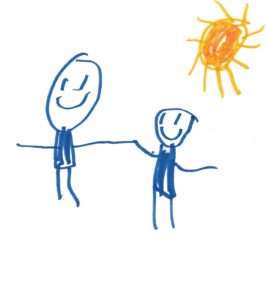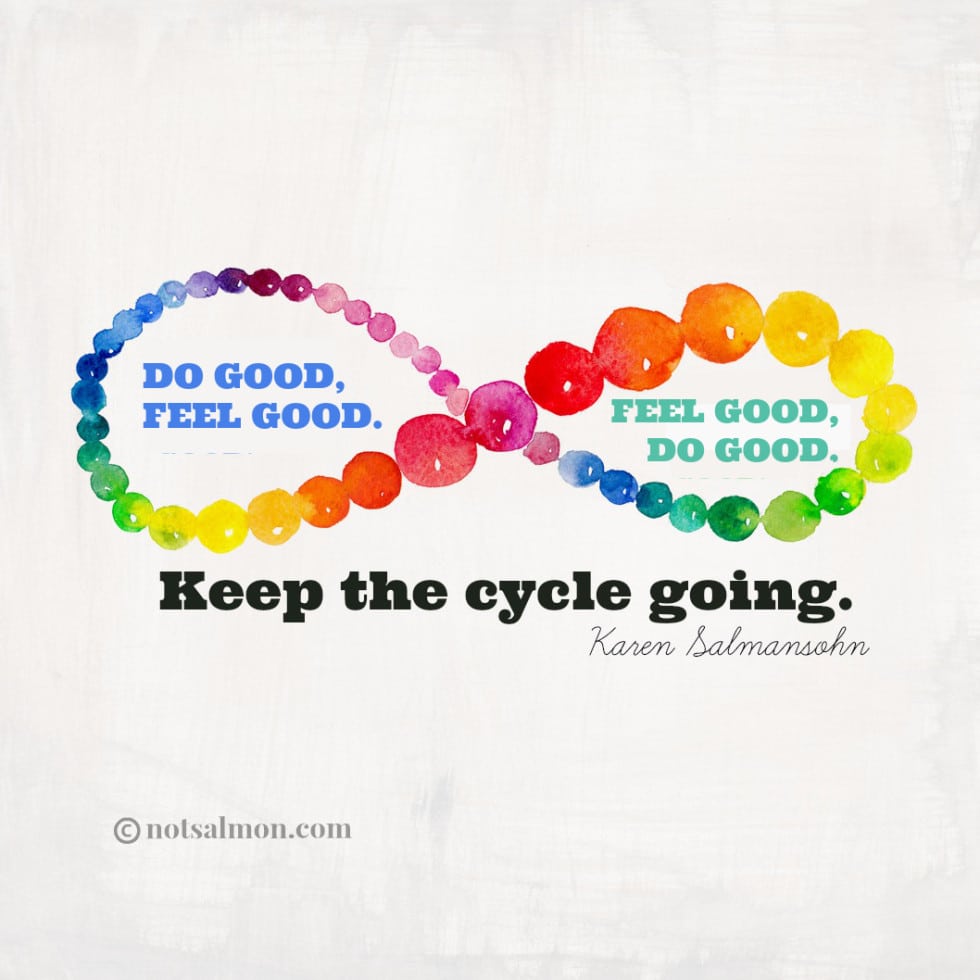How to Feel Good – Without Drugs or Alcohol
 Good Works = Path Closer To God, Not Further!
Good Works = Path Closer To God, Not Further!
Have you ever seen another human not related to you, you know… a stranger suffering ? Have you ever tried taking time out of your busy day to be genuinely kind to this stranger? if so then God bless you… you are on a better path than most. But for the most part most of us see angry people or disheveled people as useless annoyances. Pick someone one day study them, NOT LIKE A STALKER, from afar. Choose someone you feel truly could use a break. Try helping them, help from the kindness of your heart. Watch how repeated actions of this nature will in turn bring you up, raise your spirits, your self esteem and allow you to see how BLESSED BY GOD YOUR TRULY ARE! Helping others make us as humans feel good, the Devil does not want you to feel good, he wants you not helpful, miserable, angry and festering in his lies he perpetrates! He is a fraud! like most of us he lives a lie!
Over the years I have lost friends and family to drugs, a series of mistakes and poor choices. Over time I realized I can blame them for their dumb choices, or I can try to look at how it got that way. Being kind and thoughtful of their situation. I have 2 brothers, 1 dad, all raised the same! We did not all turn out the same. We all take input from our world differently. I grew up in church, very wet behind the ear, kind, thoughtful and truthful. Overtime the world hardened me, sent me down horrible paths. These paths allowed the devil into my life, once he takes hold he gets to work on making you less of you! Taking bits and pieces of your peace of mind and self esteem, removing courage from you and forcing defeat by sin into our lives.
Anyone who knows me knows I have been woke, NOT WOKE LEFTIST, but CHIRSTIAN WOKE. The devil’s plan is to confuse and gray right from wrong away, causing us to sin without knowing. The Democrat Socialist Lefty’s aks demoncrats, promote WOKE as a phrase. This steals from GODS word in 2 ways. First it causes us Christians to hate the LEFT WOKE SYNDROME, therefor cringing when we hear GODS WORD WOKE, DIFFERENT MEANING ALL TOGETHER! Secondly, for those that EAT THE LEFTIST WOKE CRAP, they CANNOT SEE GOD’S WOKE for long as they believe in HATING WHITE MEN AND LOVING GAYS as an AGENDA!
WHITE MEN ARE NOT A PROBLEM, EVIL PEOPLE ARE THE PROBLEM, THEY COME IN ALL COLORS.
“Today is my son’s birthday, he is 11 🙂 he is a present from God, I must make sure his path is as clean as possible so he does not stumble!”
Study: Doing Good Makes You Feel Good
There’s a new incentive to doing good things for others: It makes you happier, according to a new study.
Michael Steger, a psychologist at the University of Louisville in Kentucky, has always been amazed by how differently people lead their lives. Pat Tillman, for example, left the NFL to enlist in the Army and fight in Iraq and later Afghanistan (where he was killed), Steger said, but celebrity and socialite Paris Hilton continually pursues “a public life of shallowness.”
Steger couldn’t help but wonder which behavior makes people happier—seeking pleasure or doing good?To find out, he and his colleagues asked a group of 65 undergraduates to complete an online survey each day for three weeks that assessed how times they participated in hedonic, or pleasure-seeking behaviors, versus meaningful activities, such as helping others, listening to friends’ problems and/or pursuing one’s life goals.
The surveys asked the subjects how much purpose they felt their lives had each day and whether they felt happy or sad. The subjects also completed two sets of questionnaires at the beginning and end of the study to assess how they felt about their lives more generally.
They found that the more people participated in meaningful activities, the happier they were and the more purposeful their lives felt. Pleasure-seeking behaviors, on the other hand, did not make people happier.
Realizing that some people may feel guilty about reporting pleasure-seeking behaviors, Steger and his colleagues then modified the survey questions slightly to make them seem less exceptionable, and asked a new group of students to perform the study again, this time over a four-week period. The psychologists got the same results.
“A lot of times we think that happiness comes about because you get things for yourself,” said Richard Ryan, a psychologist at the University of Rochester, who was not involved in the study. But “it turns out that in a paradoxical way, giving gets you more, and I think that’s an important message in a culture that’s pretty often getting messages to the opposite effect.”
In order to make sure that the relationship between happiness and doing good wasn’t the other way around—that happiness instead leads people to do good things—the researchers looked at which tended to come first. They found that the subjects became happier after they did something good, suggesting that happiness does, in fact, come about as a result of doing good things.
The results of the study, to be published in the Journal of Research in Personality, present an “enormously optimistic picture of people, that as a cynic, I was very happy to see,” Steger told LiveScience. cited
Have you ever felt a rush after doing a good deed? Ever noticed you were more relaxed after a day of volunteering? Did you ever feel motivated to do good after thinking about the last time you helped someone? If you answered ‘yes’ to any of these questions, there’s a good explanation for why – it’s called science.
International Good Deeds Day is almost upon us and it’s time to start rallying your friends, family, coworkers, and peers to join this global movement of doing good on April 10, 2016. If your fellow good doers are still in need of some convincing, here are seven scientific facts about the benefits of doing good to share with them.
1. DOING GOOD DECREASES STRESS
According to a 2013 study examining the relationship between volunteering and hypertension, giving back can have a significant impact on blood pressure. Researchers found that adults over 50 who volunteered about four hours a week were 40 percent less likely than non-volunteers to have developed hypertension four years later.
Additionally, being generous can have the same effect, according to a 2010 study, which found that the less money people gave away, the higher their cortisol levels.
2. DOING GOOD INCREASES LIFE-EXPECTANCY
Yes, it’s true. Researchers from the University of Buffalo found a link between giving, unselfishness and a lower risk of early death. The findings show that subjects who provided tangible assistance to friends or family members (running errands, helping with child care, etc.), reported less stressful events and, consequently, had reduced mortality. In other words, “helping others reduced mortality specifically by buffering the association between stress and mortality.”
3. DOING GOOD MAKES US FEEL BETTER
Ever felt a sort of “rush” after performing a good deed? That sensation is known as ‘helper’s high’ and is produced when your brain releases endorphins, the feel-good chemicals of the brain. When you do something good for someone else, your brain’s pleasure centers light up, releasing endorphin and producing this high. Not to mention, doing good has also been known to generate feelings of satisfaction and gratitude.
4. DOING GOOD MAKES US HAPPIER AT WORK
According to a study from the University of Wisconsin-Madison, altruists in the office are more likely to be committed to their work and less likely to quit their jobs. The researchers also found that individuals in their mid-30s who rated helping others in their work as important, reported they were happier with their life when surveyed 30 years later.
Overall, the study came to an important conclusion about office altruism: those who help others are happier at work than those who don’t prioritize helping others.
5. DOING GOOD PROMOTES MENTAL HEALTH
The results are in! After an extensive review of 40 studies on the effect of volunteering on general health and happiness, the BMC Public Health journal has concluded that volunteering is also good for mental health. The review found that – along with improved well-being and life satisfaction – volunteering is also linked to decreased depression.
6. DOING GOOD LEADS TO HAPPINESS
“People who engage in kind acts become happier over time.” It’s that simple, according to Sonja Lyubomirsky, Ph.D, a professor of psychology at the University of California, Riverside. Lyubomirsky, who has studied happiness for over 20 years, found that performing positive acts once a week led to the most happiness.
In addition, Researcher Stephen Post of Case Western Reserve University School of Medicine found that when we give of ourselves, everything from life satisfaction to self-realization and physical health is significantly improved.
7. DOING GOOD WILL MOTIVATE YOU TO DO GOOD AGAIN
A 2012 study published in Psychological Science found that thinking about times you’ve helped others will make you want to help others again. The research found that reflecting on your past good deeds makes you feel selfless and want to help more, as compared to reflecting on the times others have helped you. In other words, thinking about what you’ve given others – and not only what you’ve received – will motivate you to do good again and again. cited
WHY DOING GOOD MAKES YOU HAPPY: DO GOOD, FEEL GOOD PHENOMENON
Have you ever experienced the do good, feel good phenomenon? When you do habits you’re proud of, you feel happier. For example, when you help others, you feel a helper’s high – happy, proud, excited. And because you feel good, the cycle continues. Your happiness makes you want to do even more good.
But, when you are engaged in bad behavior, you feel kind of lousy. And then this bad mood simply makes you wind up doing even more negative behavior.
Guess what? A good way to snap out of this negative cycle is to do good for someone else – so you can tap into what researchers call:
“The Do Good, Feel Good Phenomenon.”
Researchers have discovered that the more people do acts of altruism, the higher they raise their self-esteem. And thereby the higher they also raise their happiness.
Researchers call this: helper’s high
(Scroll down for a poster I designed – which sums up this do good then feel happier philosophy!)
The “Do Good, Feel Good Phenomenon” works like this…
- When someone does something good for someone, they get a “happiness high” or what researchers call “helper’s high.” (Note: I write about this more here. )
- This hit of feeling happier because you did something good makes altruistic people want to continue to do more positive, loving habits.
- By doing this good stuff, these people then continue to feel even better about themselves.
- By feeling better about themselves, this then makes these people want to continue to do even more acts of altruism.
- And onward the upward cycle goes!
Unfortunately this cycle also works in the opposite direction.
- The unhappy can become unhappier by indulging in negative behaviors.
- When people do negative actions they then lower their self esteem.
- When people lower their self esteem, they feel more unhappy.
- As a result of this unhappiness, these people then want to do more negative behaviors.
- When people do more negative habits, they further lower their self esteem, which then further makes them want to do negative behaviors – and soon they find themselves on a downward spiral.
Down, down, down their bad mood, bad habit spiral keeps going.
And down, down, down the results for their life goes.
So, watch out for those downward spirals!
Get yourself hooked on doing good and aimed in an upward spiral instead.
Below is an inspirational quote poster I designed – which sums up this upward spiral philosophy.
Think happier
Grab the happiness tools in my bestselling book Think Happy!
Boost your confidence, attitude, and mood with this powerful and thought provoking collection of short essays and happiness strategies.
It’s the perfect gift for someone you want to cheer on or cheer up – including yourself!
FACT: Doing Good Makes You Feel Happy
Have you ever heard of the so-called “do-good-feel-good phenomenon?” If not, here’s how it works.
When you do something good, you feel happier. A 2019 study revealed that performing acts of kindness – even to strangers – boosts happiness and well-being. So, let’s say, you help an elderly cross the street. There’s a part of you that feels genuinely happy because you know that you did an act of kindness to someone.
You Will Have Less Stress & Live Longer
That sensation is known as ‘helper’s high’ and is produced when your brain releases endorphins, the feel-good chemicals of the brain. When you do something good for someone else, your brain’s pleasure centers light up, releasing endorphin and producing this high.
So when you feel incredible because of altruism, you are more likely to do a selfless act to get that “happiness high” again. The feeling is very similar to the “runner’s high” where the brain’s pleasure centers light up.
The high of helping others is comparable to the “runner’s high” where the brain’s pleasure centers light up.
It’s basically like a cycle. This hit of “feeling good” is what pushes you to continue making more positive habits. A study published in 2013 showed that helping others increases life-expectancy due to reduced stress.
It’s a positive spiral where the more you help others the less stressed you are, and the longer you live. And less stress means you feel good, and when you feel good, you do good.
The more you help others the less stressed you are, and the longer you live
10 Days of Doing Good is Proven to Increase Your Happiness
Happiness is 50 percent genetic, says University of Minnesota researcher David Lykken. What you do with the other half of the challenge depends largely on determination, psychologists agree.
Two studies show that doing good deeds makes us happy. So fill up your 50% with happiness.
In one of the studies in the Journal of Social Psychology researchers in Great Britain found that good deeds do in fact make people feel good—even when performed over as little as 10 days—and there may even be more benefits if you mix up your acts of kindness, as the novelty of doing good seems linked to happiness as well.
But kindness may have a longer, and even deeper effect on our happiness (according to the second study, published online in the Journal of Happiness Studies and conducted by researchers at Harvard Business School).
This study showed people in general felt happier when they were asked to remember a time they helped someone else or bought something for someone else—even happier than when they remembered buying something for themselves.
In other words, thinking about what you’ve given others – and not only what you’ve received – will motivate you to do good again and again.
Thinking back on how you have helped others in the past gives you a feeling of happiness even today.
Unfortunately, it works the other way around too.
Have you ever noticed that when you do something bad, you feel terrible? And when you feel awful, you are more likely to do something horrible to the people that surround you.
This is often when you get to a place that centers more around yourself or seeking pleasure.
This negativity, unfortunately, affects everyone. So, unhappy people will – intentionally or not – continue to do more negative behaviours.
So why continue to spread negativity to the world when you can spread positive vibes instead?
Having someone else to help or another greater purpose is proven better for your mental health.
Here are a few tips to get your started spreading happiness around you:
- Take your mum and grandma out for lunch.
- Send an email praising a friend of colleague who deserves recognition
Researchers also found that individuals in their mid-30s who rated helping others in their work as important, reported they were happier with their life when surveyed 30 years later. - Donate food, clothing, or volunteer your time to help others
BMC Public Health journal has concluded that volunteering is also good for mental health. The review found that – along with improved well-being and life satisfaction – volunteering is also linked to decreased depression. - Do something good for the environment (recycle, use eco, reuse).
- Help an animal.
These are just a few of the acts of kindness you can do.
By Stine Smith

